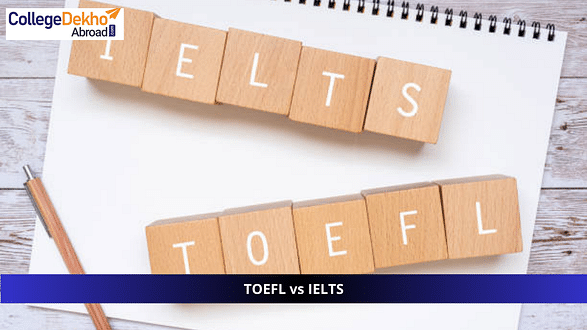Having trouble choosing between TOEFL vs IELTS? In this article, we have discussed the differences and similarities between the two popular English proficiency tests which are attempted by thousands and accepted by thousands across the globe.
Clearing an English Language Proficiency Test, like IELTS or TOEFL, is mandatory for candidates who seek admission to universities in countries like the USA, Canada, the UK, Australia, New Zealand and more. The two most popular English language tests are the International English Language Testing System (IELTS) and the Test of English as a Foreign Language (TOEFL) which are accepted by top universities all around the world.
Both IELTS and TOEFL are used to evaluate the English reading, writing, speaking and listening skills of the candidates. Conducted at an international level, students can appear for any of these tests at test centres located all around the world.
The scorecards of both TOEFL vs IELTS are accepted by thousands of universities and colleges across the world. It depends on the institute and the country if it accepts test scores of either IELTS or TOEFL tests or only one of the two. Both tests serve the same purpose i.e. to analyse the English language proficiency of the test taker. However, it is up to the candidate to precisely analyse the difference between TOEFL and IELTS and decide which test is the most suitable for them. This article is a comparative study on TOEFL vs IELTS to help students decide which of the two tests they should apply for.
Know Which Universities Abroad Accept IELTS or TOEFL!
TOEFL vs IELTS: A Quick Overview
The results of an English language proficiency test must be submitted by applicants to international universities whose native tongue is not English. The two most popular and widely acknowledged exams are IELTS and TOEFL. A student must pass all four sections of both exams — listening, reading, writing, and speaking. Although the two tests share the same purpose, they are substantially distinct from one another in many ways. The following table highlights a few facts about IELTS vs TOEFL that all prospective test-takers should know:
|
Particulars |
IELTS Academic |
TOEFL iBT |
|---|---|---|
|
Conducting Body |
British Council, IDP: IELTS Australia and Cambridge English Language Assessment |
Education Testing Service (ETS) |
|
Mode of Exam |
Paper- and Computer-based |
Internet-based (Paper-delivered test is discontinued) |
|
Cost |
INR 15,500 |
USD 190 |
|
Duration |
Two hours and 45 minutes |
Less than 2 hours |
|
Test Sections |
Listening: 30 minutes Reading: 60 minutes Writing: 60 minutes Speaking: 11-14 minutes |
Reading; 35 minutes Listening; 36 minutes Speaking; 16 minutes Writing; 29 minutes TOEFL iBT is now the shortest English language proficiency test worldwide. |
|
Speaking Section Format |
In-person with an examiner All speaking tests are recorded. |
Computer-based (students speak into a headset microphone) |
|
Breaks |
The listening, reading and writing sections do not allow breaks. However, the speaking section can be completed within a week before or after the rest of the tests. |
A 10-minute break between the listening and speaking sections |
|
Where the Test is Offered |
More than 1,600 locations in some 140 countries worldwide |
4,500 test centres in 165 countries |
|
Where scores are accepted |
Accepted by more than 10,000 institutions globally |
Accepted by 11,000 institutions across 150+ countries |
|
Results Timeline |
Paper-based IELTS results are announced in online mode 13 days after the test date. Computer-based IELTS results are available online within 3-5 days after taking the test. |
Results are available online approximately 6 days after taking the test. |
|
Scoring Scale |
1 to 9 |
0 to 120 |
|
Score Validity |
Two years |
Two years |
Check out the video to find out the differences between IELTS and TOEFL and which exams you should take for studying abroad:

IELTS vs TOEFL: Which Exam Should You Take?
Choosing between TOEFL vs IELTS should be a simple process for most students as the first deciding parameter involves the university and countries and their preference between the two tests. However, there can be several other parameters that are unique to you and your needs with regard to studying abroad.
The IELTS exam and TOEFL exam are conducted by two different organisations. The IELTS exam first started in 1989 and was managed by both IDP and the British Council. Now, the IELTS is entirely managed by IDP India. On the other hand, TOEFL is conducted by Educational Testing Service (ETS). Now, to understand which test, i.e. IELTS vs TOEFL, you should take to take admission to some of the top universities in the world, check out the following points:
TOEFL vs IELTS - Exam Acceptance
If you are confused about whether to take the IELTS vs TOEFL test then the first thing that you must decide is the country and institute to which you want to take admission. TOEFL is widely accepted by universities in the USA. So, if your study abroad destination is the United States then choosing the TOEFL tests will be a good option for you. On the other hand, in most universities in countries like the United Kingdom, Canada, Australia, New Zealand, etc, IELTS scores are popularly accepted over TOEFL results and scores.
However, there are many universities and countries which accept international student applications on the basis of both IELTS and TOEFL scorecards. So, deciding between TOEFL vs IELTS must depend on the university and country you want to apply to for your higher studies abroad.
It should be noted that a few countries like Poland do not require IELTS or TOEFL scores for admissions to undergraduate and graduate studies abroad. Here, most universities may be satisfied with having the English language of instruction in the qualifying examination as the only criteria for international student admissions in these countries and universities.
IELTS vs TOEFL - Exam Structure
While comparing differences in IELTS vs TOEFL, a major difference can be seen in the exam pattern of both tests. Moreover, recently the focus in the improved edition of TOEFL has been placed on making the testing process as simple as practicable. Multiple improvements have been made to the revised edition of the TOEFL, with the goal of streamlining and optimising it to increase student efficiency beginning July 26, 2023. TOEFL iBT has become the shortest English language competency test in the world, as ETS published a newer and shorter exam TOEFL iBT version (less than 2 hours) to give students an easier and faster testing experience.
The exam pattern for IELTS and TOEFL tests includes four sections, i.e. Reading, Writing, Speaking and Listening sections. However, the structure varies for IELTS and TOEFL tests. Check out the tables below highlighting the IELTS vs TOEFL exam pattern differences:
Reading and Listening
|
TOEFL |
IELTS |
|---|---|
|
Contains Multiple Choice Questions (MCQs) Each of these MCQs has one correct answer or multiple correct answers. |
The IELTS test has Fill in blanks, MCQs as well as short-answer questions |
Speaking
|
TOEFL |
IELTS |
|---|---|
|
You will have to attend the speaking section on a microphone in front of a computer |
You will have to speak in front of a person (interviewer) |
Writing
|
TOEFL |
IELTS |
|---|---|
|
The duration of the writing section of TOEFL is 29 minutes. There are two tasks in this section which shall be answered. |
There are two writing tasks in this section. Each task needs to be answered within 30 minutes. |
TOEFL vs IELTS - Exam Fees
The TOEFL exam fee usually depends on the location where you are taking the test. Check out the following table to better understand the fee difference between TOEFL and IELTS.
|
Category |
IELTS Exam Fees (in INR) |
TOEFL Exam Fees (in USD) |
|---|---|---|
|
Registration Fees |
15,500 |
190 |
|
Cancellation Fees |
2,325 deducted from the application fee Rest will be refunded only if cancelled five weeks before the test date |
50% of exam fees Applicable only if cancelled four days before the test date |
|
Rescheduling Fees |
2,325 Applicable only if applied for transfer/rescheduling five weeks before the test date |
60 |
As depicted in the table above, one of the major IELTS vs TOEFL differences can be seen in the exam fees for both tests. It should be noted that the IELTS exam fee and the fee for the TOEFL exam are subject to change at the discretion of the official exam administrators, i.e. IDP India for IELTS in India and ETS for TOEFL iBT.
IELTS vs TOEFL - Exam Difficulty Level
The difficulty level of both the TOEFL and IELTS is the same. However, most candidates who take the test find the IELTS easier than TOEFL because of the test's structure, pattern, and design. While the TOEFL exam is lengthy and exhaustive, IELTS exams are well structured and organised, as per the feedback received from test-takers.
Having said that, exam difficulty in either IELTS or TOEFL may not be applicable to all candidates. Some test-takers may also find TOEFL exams easier than IELTS exams. The following comparison of the two tests will help individuals decide which of the two, i.e. TOEFL vs IELTS is easier for them:
-
IELTS reading, writing and listening sections are conducted on the same day, while the speaking section can be taken after a gap of 5 to 10 days. So, there is enough time to relax and prepare. On the other hand, all four sections of the TOEFL exams are conducted on the same day.
-
The IELTS speaking section is a face-to-face interaction between the examiner and the candidate. On the other hand, the TOEFL speaking section is recorded in front of a computer using a microphone. So, the candidate can decide whether they are comfortable taking the test in front of someone or a computer. If you are confused between the two, check out IELTS Computer-based vs Paper-based Test: Which is Better?
Although comparing TOEFL and IELTS scores precisely is a challenging task, a rough degree of equivalence can be enacted with a range of levels typically sought by academic and B-schools. These tiers can also be contrasted with the Common European Framework of Reference's (CEFR) standards of reference. This is a criterion that is used all around the world to define English language competence.
In general, TOEFL performance is evaluated on a scale from 0 to 120 points (lowest to highest), whereas IELTS scores are presented as band scores on a scale from 1 to 9 (lowest to highest). The relative placement of these is shown in the following table:
|
User Level |
TOEFL iBT (120) |
IELTS Band (9.0) |
CEFR Level |
|---|---|---|---|
|
Basic |
NA |
NA |
A1 |
|
NA |
NA |
A2 |
|
|
Independent |
0 to 31 |
0 to 4 |
B1 |
|
32 to 34 |
4.5 |
||
|
35 to 45 |
5 |
||
|
46 to 59 |
5.5 |
B2 |
|
|
60 to 78 |
6 |
||
|
79 to 93 |
6.5 |
||
|
Proficient |
94 to 101 |
7 |
C1 |
|
102 to 109 |
7.5 |
||
|
110 to 120 |
8 |
||
|
NA |
8.5 |
C2 |
|
|
NA |
9 |
These are some of the major differences that can be seen when choosing between TOEFL vs IELTS for admissions to top universities abroad. Check out the following lists of universities accepting scores of IELTS or TOEFL, depending on their individual admission policies.
TOEFL vs IELTS Which is Easier?
Your four main language skills — speaking, listening, writing, and reading —will all be evaluated by both the IELTS and the TOEFL exam. Since these tests are standardised, the scores are comparable around the world.
Speaking is where these two assessments differ most from one another. The IELTS demands you to talk with a live person, whereas the TOEFL needs you to interact with a machine. Many individuals find it peculiar to speak to a computer system, which is one reason why they tend to bend towards the IELTS exam.
In total, there are approximately six questions on TOEFL that must be solved within roughly 20 minutes. Here, you will be responding to these questions by communicating with a computer using a microphone on subjects that are quite popular worldwide. Test takers score remarkably well on the IELTS speaking section since it is conducted in person and seems like a typical conversation.
Further, the TOEFL listening section takes about 60 minutes to complete, whilst the IELTS exam takes about 30 minutes. The TOEFL test tends to be too lengthy, which causes students to become sidetracked and possibly sometimes miss out on spelling the right answers.
Recommended Reads:
Popular Universities Abroad Accepting IELTS Score
The results of the IELTS exam are very important to your academic future. A high IELTS score will help you get admittance into several prestigious universities abroad that only recognise IELTS. However, before applying, make sure you check the minimum IELTS cutoff for your preferred universities on their respective official university website. Here is a list of the best international students' universities abroad that accept IELTS:
| University of Illinois, USA | |
|
Amity University in London |
Popular Universities Abroad Accepting TOEFL Score
The majority of top universities abroad including prestigious B-schools accept the TOEFL, but depending on the particular institution and their specialised programmes, the TOEFL score requirements may differ. The TOEFL score needed for a full-time MBA, for instance, might not be the same as that needed for an executive programme. Knowing the minimal TOEFL cutoff requisite before applying to universities abroad is therefore essential. The following is a list of the popular international universities abroad that accept TOEFL:
| University of South Florida | |
| Technological University Dublin | |
| University of Debrecen | |
| The Australian National University | |
| Imperial College London |
Note: Students must confirm the English Language Test eligibility criteria for their respective universities before taking either of the two tests.
IELTS vs TOEFL differs in many ways, although having a comparable objective, as can be seen through a comparison of the two exams. The four questions presented beneath will help you determine which test is better for you in the mindful debate of IELTS vs TOEFL:
-
Which one is cheaper?
-
Which one is easier?
-
Which test does your preferred university accept?
-
Which test highlights your strengths?
The two most often given English language proficiency tests are the TOEFL and IELTS. Listening, reading, writing, and speaking are the same four skills that are tested on both exams, but the structure and methodology of the assessments vary. Make certain that you are cognizant of these discrepancies well in advance if you intend to take one of these tests to study abroad.
Still confused between TOEFL vs IELTS? Drop us a line at abroad@collegdekho.com to resolve all your confusion and let our experts help you select the right university abroad based on your IELTS/TOEFL scores!
Apply to Top Universities Abroad Based on Your TOEFL/IELTS Scores!
























